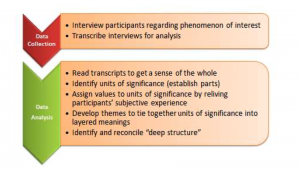INTERPRETIVE RESEARCH
General Summary
- This kind of research is more about theory-building i.e. the researcher usually starts with data and facts and then uses it to construct a theory
- This type of research often calls upon qualitative research methods but can still utilize quantitative
- Different from positivist methodology in that those methods typically begin with a theory and then test the theory and try to construct the data and research
- Interpretive research focuses very heavily on the meaning of things within the research and it is important to try to remain as unbiased as possible because often times, the researcher is apart of the experiment
- Interpretive research can be found more often in anthropology, sociology, psychology and so on down the line
DISTINCTIONS
- Interpretive is a theoretical sampling (based on criteria) whereas positivist is random sampling
- Interpretive calls for a clear distinction in bias because they are a part of the research – positivist must refrain from using bias
- Simultaneous analysis is accepted because it often leads to a more refined question and allows better research to go on whereas positivist is more results and significance-based which can mean that a project needs to be restarted if the question is refined
BENEFITS AND CHALLENGES
- Very useful for dissecting intricate and diversely faceted issues
- Awesome for theory construction when not a lot of data or analysis currently exists
- Can aid tremendously in discovering more meaningful questions to be asked – calling for follow-up research
- Very time-consuming
- Requires trained researchers who are able to identify what they are looking for separate of their own bias in their interfaces
- Can be credibility discrepencies
- Can largely fail to answer important questions
CHARACTERISTICS
- Researcher as instrument
- Interpretive analysis
- Use of expressive language
- Temporal Nature
- Hermeneutic Circle
INTERPRETIVE DATA COLLECTION
- Interviews and Observation are two very easily-accessible instances to employ this research
RESEARCH DESIGNS
- Case Research
- Action Research
- Diagnosing
- Action planning
- Action taking
- Evaluating
- Learning
- Ethnography
- Phenomenology
- Get a sense of the whole
- Establish significance
RIGOR IN INTERPRETIVE RESEARCH
- Dependability – Independent arrival at the same conclusion
- Credibility – Readers find it to be believable
- Confirmability – Independently confirmed by others
- Transferability – Extent to which findings can be generalized to other settings



Winston,
I really enjoyed your chapter 12 summary. I think you did a good job of breaking down the major points of the chapter and avoiding going into too much detail that was included in the chapter. Your summary made it very easy to understand the major points that we found in Chapter 12. Describing Interpretive research as the opposite of positivist research made it very clear, the idea that instead of coming up with a theory and then testing it, you would start with the data or results and then form a theory that applies to that data. This was much easier to understand. I also liked how you included the figures from the chapter to help explain, I thought that was very helpful as well. This chapter was pretty straight forward, but I thought you did a nice breakdown of everything.